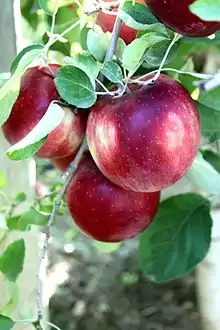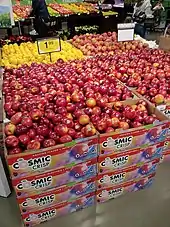Cosmic Crisp
Cosmic Crisp is an American apple with the variety designation 'WA 38'.[1] Breeding began in 1997 at the Washington State University (WSU) Tree Fruit Research and Extension Center in Wenatchee, Washington, initially overseen by Bruce Barritt and now by Kate Evans.[2]
| Cosmic Crisp | |
|---|---|
 | |
| Genus | Malus |
| Species | Malus domestica |
| Hybrid parentage | Honeycrisp × Enterprise |
| Cultivar | 'WA 38' |
| Marketing names | Cosmic Crisp |
| Origin | Wenatchee, Washington, United States |
Characteristics
Cosmic Crisp is a cross between Honeycrisp and Enterprise apples. It is intended to have the texture and juiciness of the Honeycrisp, and the late-ripening behavior and long storage of the Enterprise.[3] In breeding the variety, the focus was not on the appearance, but on durability and shelf life. Cosmic Crisp is characterized mainly by uniformly colored dark red skin, dense firm flesh, and an improved shelf life.[4] The look of the apple's light lenticels against its wine-red skin reminded focus groups of a galaxy against a night sky, which led to it being named the Cosmic Crisp.[1] It is the first widely-grown apple variety developed in Washington.[5]
The apple ripens at the same time as Red Delicious and is expected by the producers of it to replace a large part of the Red Delicious stocks. Cosmic Crisp was made available to consumers in 2019,[6] after 20 years of development.[7][8]
The New York Times described the apple as "dramatically dark, richly flavored and explosively crisp and juicy", making it "the most promising and important apple of the future".[9] FoodRepublic.com called it "firmer than the Honeycrisp, but not too firm. And it is high in both sugar and acidity, making it far superior to the Red Delicious, Gala and Fuji varieties as well."[10] Northwest Public Radio notes that Washington, which produces 70% of U.S. apples, is betting that the apple will "conquer" the market.[11]
First plantings
The variety was first planted for commercial use in spring 2017, with 12 million trees pre-ordered by Washington state orchards.[12] The variety is initially only available to Washington-based growers, and will remain limited to them for at least ten years. Growers pay a royalty for each tree purchased and for each box of apples sold. Interest was so high the trees initially had to be distributed to apple farmers in a lottery held in 2014—WSU had planned to provide 300,000 saplings but were met with requests for 4 million.[13][5] Within three years, over 13 million Cosmic Crisp trees had been planted. Lawsuits emerged between WSU and a Seattle spinoff that the university claimed distributed over 100,000 trees improperly.[14][15] WSU owns the Cosmic Crisp patent.
Promotion and marketing

A $10 million consumer launch of the product was funded by Washington State agriculture promotion funds through the Washington Apple Commission and other agencies.[5] The two taglines for the apple were "Imagine the Possibilities" and "The Apple of Big Dreams".[1] It is said to be the largest campaign in apple industry history,[16] and included payments to social media influencers and a partnership with a touring children's production of Johnny Appleseed.[17] The term "Cosmic Crisp" is trademarked.[1]
The apples went on sale in Seattle grocery stores on December 1, 2019, beginning with a QFC store at University Village.[18]
See also
- Crimson Delight, Washington State University's first apple variety, also known as WA 2
References
- Jarvis, Brooke (July 18, 2019). "The Launch". The California Sunday Magazine. Retrieved 23 July 2019.
- "Horticulturalist, fruit breeder Kate Evans to lead WSU Tree Fruit Research and Extension Center | WSU Insider". WSU Insider. Washington State University. July 18, 2019. Retrieved 2 October 2019.
- Scribner, Herb (2019-08-13). "The Cosmic Crisp may be your new favorite apple. Here's what it tastes like". Deseret News. Retrieved 2020-12-17.
- Ferolito, Phil (May 19, 2016). "Cosmic Crisp getting an out-of-this-world reception from apple growers, breeders". Retrieved 28 September 2016.
- Baker, M. Sharon (November 24, 2017), "The Next Big Apple Variety Was Bred for Deliciousness in Washington", Seattle Business
- "The Facts". Cosmic Crisp. Archived from the original on 30 September 2017. Retrieved November 3, 2016.
- Valdes, Manuel (24 February 2016). "Washington's new apple joining a changing industry". Associated Press. Retrieved 24 December 2019.
- Eddy, David (8 October 2014). "Washington State University Names Growers Of New Apple Trees". Growing Produce. Retrieved 1 November 2016.
- Karp, David (November 3, 2015). "Beyond the Honeycrisp Apple". The New York Times. Retrieved 1 November 2016.
- "Meet The Cosmic Crisp, The Apple Of The Future". Food Republic. November 4, 2015. Retrieved 1 November 2016.
- Bartlett, Max (November 24, 2015). "There's A Lot Of Buzz About The Cosmic Crisp... Hitting Shelves In 2019". NWPR. Archived from the original on 4 November 2016. Retrieved 1 November 2016.
- Charles, Dan (May 2, 2017). "Washington Apple Growers Sink Their Teeth Into The New Cosmic Crisp". NPR.org. Retrieved June 12, 2017.
- Wheat, Dan (December 3, 2013). "Yakima firm to help with new apple variety". Capital Press.
- 'Cosmic Crisp' conflict: Washington State University sues its own spinoff in dispute over 'apple of the future', Taylor Soper, Geekwire, March 2018
- Meyers, Donald W. (April 18, 2018). "Apple controversy: Who can sell Cosmic Crisp trees?". Yakima Herald.
- Bloomberg, Kate Krader (January 2, 2019). "The search for the next Honeycrisp apple". The Gazette. Colorado Springs. Retrieved 2019-03-10.
- Chris Koger (December 7, 2018), "Cosmic Crisp apples to launch with $10 million campaign", Produce Market Guide
- "Seattle QFC debuts first apple ever bred in Washington". KOMO-TV. Associated Press. December 1, 2019.
Further reading
- "I developed a sturdier, crisper, and yummier apple" by Bruce Barritt as told to Amal Ahmed, Popular Science, May 18, 2018
